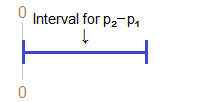I have the following problem: given a proportion $p_1=\frac{X_1}{n}$, where $X_1$ is the number of succesful outcomes in $n$ tries ($X_1$ and $n$ are both > 100), I have to find the smallest proportion $p_2$ that is greater than and statistically different from $p_1$ at a given confidence level (e.g. 95%). An application of this would be to find out a success rate (i.e., $X_2$ successes in $n$ tries) that would ensure that a given enhancement to a system would actually be beneficial.
I could find the confidence interval for $p_1$ but merely having $p_2$ outside this interval wouldn't be enough to assure these proportions would be different. Doubling the interval didn't seem right either.
I also tried using the formulas for the confidence interval for the difference of proportions
$c = p\mp z\cdot s_p$
where $p = p_1-p_2$ is the difference between the proportions and $s_p$ is given by
$s_p = \sqrt{\frac{p_1(1-p_1)+p_2(1-p_2)}{n}}$
but I couldn't figure out how to get $p_2$ from them. Any hints on how I might proceed?
For what it's worth, this is not homework, but a slightly reworded problem from a book I'm using for self-study.
EDIT: Glen's answer put me in the right direction. It also occurred to me to brute force a solution, posted below.


self-studytag. (take a look and decide for yourself) $\endgroup$